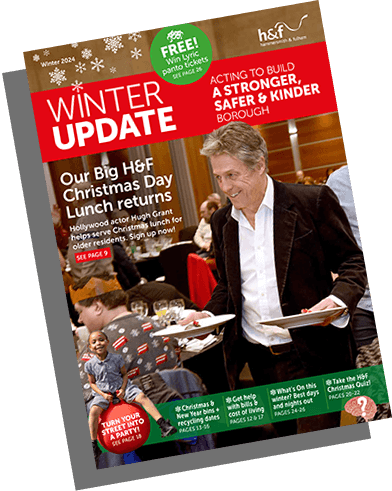
Christmas is a very busy period, when we are eager to get that ideal gift for our loved ones and organise the perfect day. But that can leave us susceptible to falling for opportunistic scams, both online and in person.
Keeping our residents safe is our number one priority. So we asked H&F Council's Trading Standards team to put together some essential tips to help you stay vigilant and protect your money over the holidays.
Read on for advice on what to look out for, including fake websites, parcel delivery scams, suspicious Christmas e-cards and more.
Support local and stay safe
As you shop for the perfect gifts this holiday season, remember to check you are dealing with a reputable trader.
Avoid:
- websites that don't have a full company name or a UK address – it can be more challenging to recover lost funds, and you can be less confident that the goods are safe.
- unregistered street sellers.
Instead, support our local businesses. Shopping locally not only ensures stronger consumer protection but also helps put money back into our community. Reputable businesses typically offer excellent customer service, increasing your chances of recovering your money if items are lost.

Stay savvy
If you come across a deal that seems unbelievably good, take a moment to pause and research it. Sometimes, offers that appear too good to be true might have hidden catches.
By taking your time and making an informed decision, you can ensure a low-risk shopping experience this festive season.
Watch out for holiday lets scams. Scammers advertise and take prepayments on premises which are not theirs to let.
Beware tickets advertised for concerts and sporting events at comparatively low prices. You should only purchase tickets through authorised ticket agents.
Use secure payment methods
When shopping online, look for the padlock symbol in the address bar and 'https://' in the URL – this indicates that the site is secure. If you are making a purchase, credit cards offer better protection against fraud and unauthorised charges than debit cards.

Be aware of Christmas delivery scams
As you eagerly await your holiday packages, be cautious of text messages claiming you missed a delivery and need to click a link to pay for redelivery. Legitimate delivery companies do not charge fees for redelivery.
Avoid clicking the link, especially if you are not expecting a delivery from that company, as it could contain malware designed to steal your data.
Always verify the legitimacy of any message by contacting the company or person directly through official channels.
Christmas e-card scams
Watch out for e-card scams. These emails might look friendly, but they can be dangerous. Don't click links or download anything from an unknown sender. Scammers use e-cards to spread malware or trick you into sending money. If you get an unexpected e-card, verify who sent it before you do anything else.
Lonely this Christmas?
Scammers often try to exploit vulnerable people through romance scams. They might create fake profiles on dating sites or social media, pretending to be interested in a relationship. Once they gain your trust, they may ask for money or personal information.
To protect yourself, be cautious when interacting with people online. Never send money or share sensitive information with someone you haven't met in person.
Where to go for advice
All issues should be reported (online or by phone) to our partners at the Citizens Advice Consumer Helpline. They can provide basic advice, signposting and refer anything that is a criminal matter to the H&F Trading Standards team.





